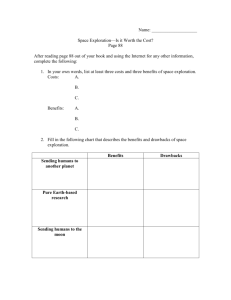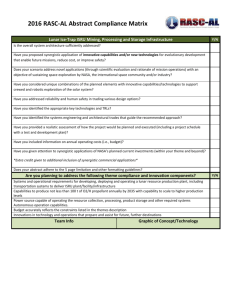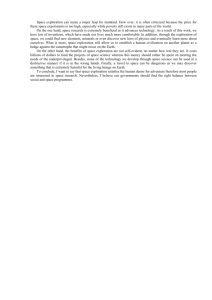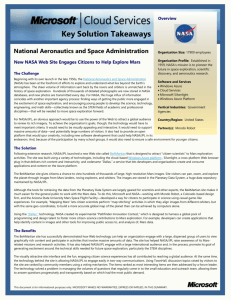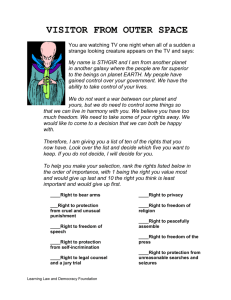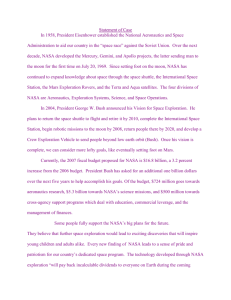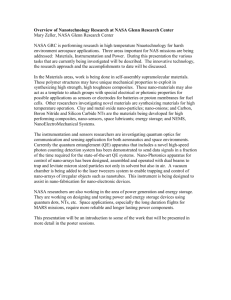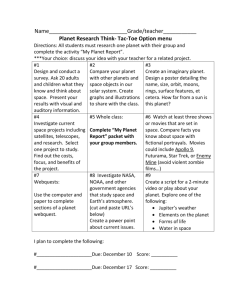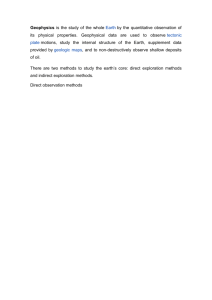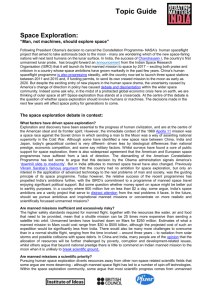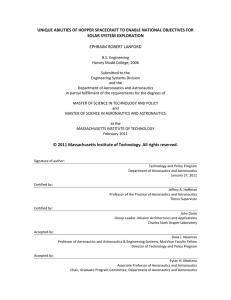Example Annotated Bib.
advertisement
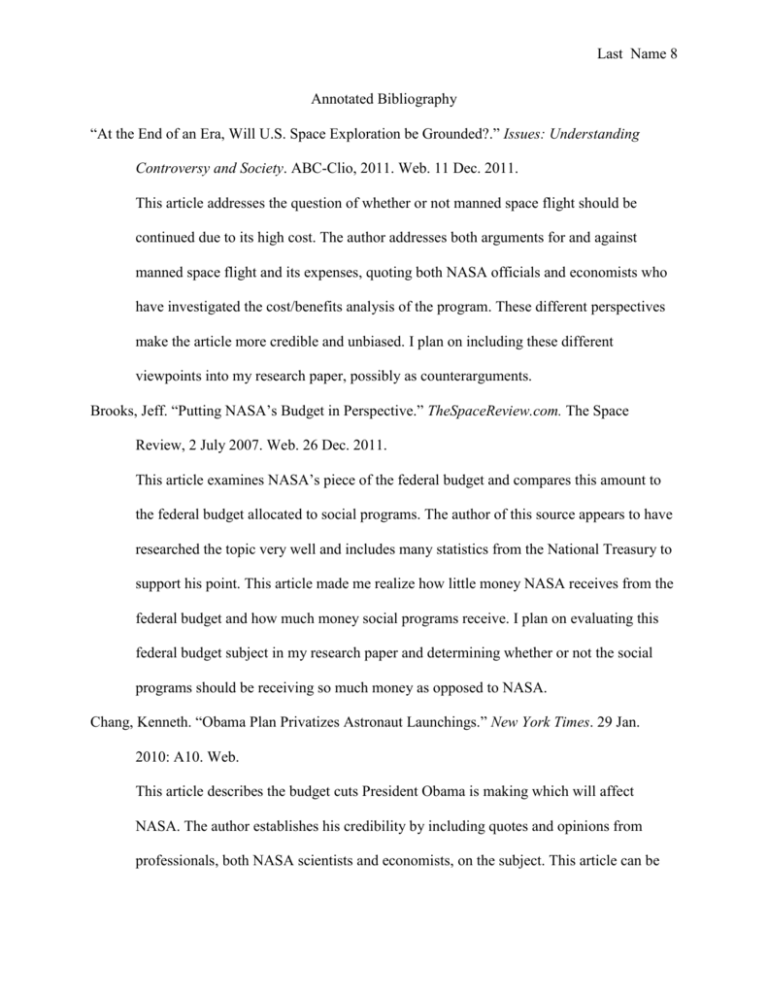
Last Name 8 Annotated Bibliography “At the End of an Era, Will U.S. Space Exploration be Grounded?.” Issues: Understanding Controversy and Society. ABC-Clio, 2011. Web. 11 Dec. 2011. This article addresses the question of whether or not manned space flight should be continued due to its high cost. The author addresses both arguments for and against manned space flight and its expenses, quoting both NASA officials and economists who have investigated the cost/benefits analysis of the program. These different perspectives make the article more credible and unbiased. I plan on including these different viewpoints into my research paper, possibly as counterarguments. Brooks, Jeff. “Putting NASA’s Budget in Perspective.” TheSpaceReview.com. The Space Review, 2 July 2007. Web. 26 Dec. 2011. This article examines NASA’s piece of the federal budget and compares this amount to the federal budget allocated to social programs. The author of this source appears to have researched the topic very well and includes many statistics from the National Treasury to support his point. This article made me realize how little money NASA receives from the federal budget and how much money social programs receive. I plan on evaluating this federal budget subject in my research paper and determining whether or not the social programs should be receiving so much money as opposed to NASA. Chang, Kenneth. “Obama Plan Privatizes Astronaut Launchings.” New York Times. 29 Jan. 2010: A10. Web. This article describes the budget cuts President Obama is making which will affect NASA. The author establishes his credibility by including quotes and opinions from professionals, both NASA scientists and economists, on the subject. This article can be Last Name 9 included in my research paper to support my opinion that NASA’s share of the national budget is not overwhelming and is worth continued funding. Cohen, Tamara. “Colonies on Mars will flourish and we will eventually conquer the universe, says Stephen Hawking.” MailOnline.com. Mail Online, 7 Jan. 2012. Web. 8 Jan. 2012. This article shows Stephen Hawking’s opinion of space exploration. He believes that the human race will not survive if we do not continue to explore space and find another planet that will support life. The author establishes credibility by including Hawking’s direct quotes. This article provides an expert opinion on the topic. I plan on including Stephen Hawking’s opinion about space travel in my research paper. “Discovered: The first habitable ‘Earth-like’ planet.” The Week. 6 Dec. 2011: n. pag. Web. This article describes the new discovery of a planet very similar to Earth. This new planet was named Kepler-22b and is found in the habitable zone orbiting a star very similar to our Sun. The author seemed to have researched this topic thoroughly. There are a few expert opinions and they are correctly sited. This article gave me more information about the newly discovered planet, but I probably won’t end up using it since I already have a similar article on the topic. Docksai, Rick. “Down-to-Earth NASA.” The Futurist 1 July 2010: 9. Web. This article discusses the fact that conducting space explorations without humans will greatly reduce the cost. NASA will use the money left over to study the climate change on Earth. The sources and references are clearly stated and documented. This article was useful and I plan on disproving the fact that replacing humans in space will be more cost effective. In reality, it will probably be less efficient. Krauss, Lawrence. “One-Way Ticket to Mars.” New York Times 1 Sept. 2009: n. pag. Web. Last Name 10 This article describes how offering a one-way trip to Mars for astronauts would cut back on the money spent on space exploration. I believe this is a reliable source. It is from a reputable newspaper and the author refers to experts and describes the experiments he completed on the topic. This article is slightly biased; the author clearly states his opinion about robots, instead of humans, performing experiments in space. Despite this bias, I found this article to be very helpful. I plan on using the idea for a one-way trip to Mars as an example of a way to cut NASA’s spending on space exploration. Kreiger, Lisa. “Newly Discovered Planet in Habitable Zone.” MercuryNews.com. The Mercury News, 4 Dec. 2011. Web. 9 Dec. 2011. This article described the recent discovery of the planet Kepler-22b which is located in the habitable zone. It also highlights the many similarities between this newly discovered planet and Earth, suggesting that Kepler-22b may be able to sustain life. The information in this source is reliable and doesn’t seem to be biased. The quotes and references to experts on the Kepler team add to the article’s credibility. This article provides an example of how sometimes the expenses of space exploration can be worth it due to the many benefits, and I plan on using this example in my paper. Pop, Virgiliu. “Is Space Exploration Worth the Cost?.” Space Daily.com. Space Daily, 19 Jan. 2004. Web. 13 Dec. 2011. This article discusses whether or not we should cut spending on space exploration. This was a useful source, as it gives various opinions on the topic. The author adds statistics to support his view on the topic and get his point across. I plan on using a couple of the author’s statistics and key points in my research paper to support my argument or refute a counterargument. Last Name 11 Thompson, Mark. “Space Exploration: At What Cost?.” Discovery.com. Discovery News, 9 Apr. 2011. Web. 16 Dec. 2011. This article focuses on the money used for space exploration and if it would be better used to fix earthly problems. The author states that the money put aside to fix these problems is often misused and that money can’t fix every problem. Therefore, the author states that the money is best spent in space. This article seemed well-researched and reliable as it included statistics from reputable sources. The article made me realize that not all problems can be fixed with money. I plan on using the idea that space exploration can actually fix earthly problems in my research paper and providing examples that support this idea (such as water purification and advances in medicine, as stated in the article).
